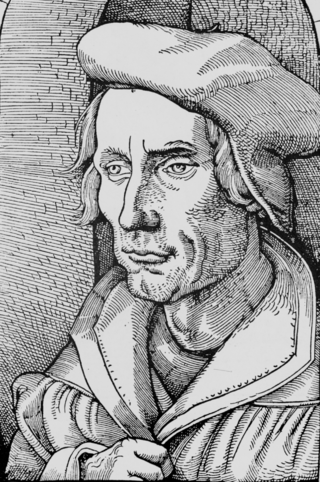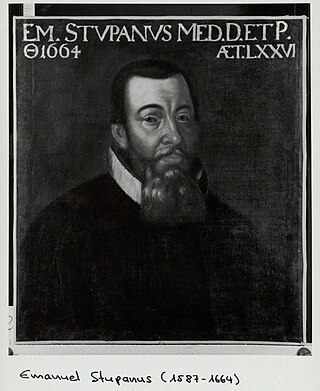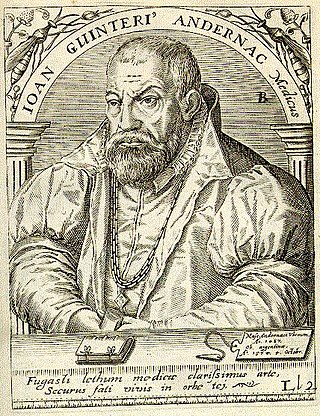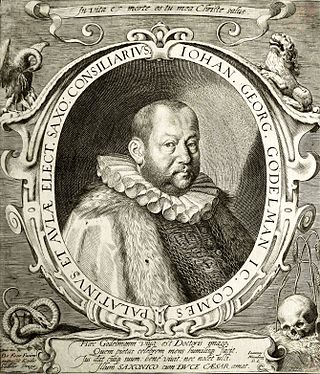
Paracelsus, born Theophrastus von Hohenheim, was a Swiss physician, alchemist, lay theologian, and philosopher of the German Renaissance.

Friedrich Hoffmann or Hofmann was a German physician and chemist. He is also sometimes known in English as Frederick Hoffmann.
The Caprotinia, or feasts of Juno Caprotina, were ancient Roman festivals which were celebrated on July 7, in favor of the female slaves. During this solemnity, they ran about, beating themselves with their fists and with rods. None but women assisted in the sacrifices offered at this feast.

Ulisse Aldrovandi was an Italian naturalist, the moving force behind Bologna's botanical garden, one of the first in Europe. Carl Linnaeus and the comte de Buffon reckoned him the father of natural history studies. He is usually referred to, especially in older scientific literature in Latin, as Aldrovandus; his name in Italian is equally given as Aldroandi.

Franz von Paula Schrank was a German priest, botanist and entomologist.

Rudolph Goclenius the Younger was a German physician and professor at Philipps University of Marburg.

Pseudo-Apuleius is the name given in modern scholarship to the author of a 4th-century herbal known as Pseudo-Apuleius Herbarius or Herbarium Apuleii Platonici. The author of the text apparently wished readers to think that it was by Apuleius of Madaura (124–170 CE), the Roman poet and philosopher, but modern scholars do not believe this attribution. Little or nothing else is known of Pseudo-Apuleius apart from this.

John Jonston or Johnston was a Polish scholar and physician, descended from Scottish nobility and closely associated with the Polish magnate Leszczyński family. The standard author abbreviation Jonst. is used to indicate this person as the author when citing a botanical name.

Gideon Brecher, also known by the pen name Gedaliah ben Eliezer (Hebrew: גדליה בן אליעזר, was an Austrian writer and physician. He was a central figure in the Moravian Haskalah.

Otto Brunfels was a German theologian and botanist. Carl von Linné listed him among the "Fathers of Botany".
Agathotychus was an ancient veterinary surgeon, whose date and history are unknown, but who probably lived in the 4th or 5th century AD. Some fragments of his writings are to be found in the collection of works on this subject first published in a Latin translation by Joseph Ruellius, Veterinariae Medicinae Libri duo.

Janus Cornarius was a Saxon humanist and friend of Erasmus. A gifted philologist, Cornarius specialized in editing and translating Greek and Latin medical writers with "prodigious industry," taking a particular interest in botanical pharmacology and the effects of environment on illness and the body. Early in his career, Cornarius also worked with Greek poetry, and later in his life Greek philosophy; he was, in the words of Friedrich August Wolf, "a great lover of the Greeks." Patristic texts of the 4th century were another of his interests. Some of his own writing is extant, including a book on the causes of plague and a collection of lectures for medical students.

Theatrum Chemicum is a compendium of early alchemical writings published in six volumes over the course of six decades. The first three volumes were published in 1602, while the final sixth volume was published in its entirety in 1661. Theatrum Chemicum remains the most comprehensive collective work on the subject of alchemy ever published in the Western world.
Oxymel is a mixture of honey and vinegar, used as a medicine. According to Scientific American, recently the mixture has been used successfully in a biofilm for topical uses on wounds where bacteria has become resistant to antibiotics, both ingredients having been used historicaly as antiseptics, but the combination was reported as killing as much as 1,000 times more bacteria than vinegar alone and as much as 100,000 times more than honey alone in biofilms.

Emmanuel Stupanus was a Swiss physician and professor in Basel.

Johann Winter von Andernach was a German Renaissance physician, university professor, humanist, translator of ancient, mostly medical works, and writer of his own medical, philological and humanities works.

The Lympha is an ancient Roman deity of fresh water. She is one of twelve agricultural deities listed by Varro as "leaders" (duces) of Roman farmers, because "without water all agriculture is dry and poor." The Lymphae are often connected to Fons, meaning "Source" or "Font," a god of fountains and wellheads. Lympha represents a "functional focus" of fresh water, according to Michael Lipka's conceptual approach to Roman deity, or more generally moisture.

Johann Georg Gödelmann, was a German jurist, diplomat and demonological writer. He was born in Tuttlingen, and died, aged 51, in Dresden.

The Hortus Sanitatis, a Latin natural history encyclopaedia, was published by Jacob Meydenbach in Mainz, Germany in 1491.

Johannes Engel, also known as Johannes Angelus, was a doctor, astronomer and astrologer from Aichach, near Augsburg, which at that time was a Free Imperial City within the Holy Roman Empire. He practiced medicine in Vienna, and published numerous almanachs, planetary tables and calendars. His Astrolabium planum was published by Erhard Ratdolt of Augsburg in 1488; a second edition was printed by Johann Emerich for Lucantonio Giunti in Venice in 1494.

















